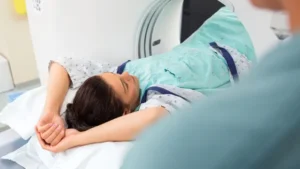Have you ever dealt with ongoing stomach pain, unexplained nausea, or difficulty swallowing and wondered if it could be something more serious? While occasional discomfort is often due to minor issues, there are times when your body may be indicating a more significant problem. This is where an endoscopy can help provide clarity.
An endoscopy is a minimally invasive procedure that enables doctors to take a closer look at your digestive tract to diagnose and treat various conditions. But how do you know when it’s the right time to consider this procedure? Let’s examine the key warning signs, symptoms, and conditions that might necessitate an endoscopy. By recognizing these red flags, you’ll be better prepared to discuss this potentially life-changing procedure with your doctor.
Interested? Read on to discover the symptoms to be aware of and when an endoscopy might be the next step in your healthcare journey.
What Is an Endoscopy?
Before we delve into the warning signs, let’s briefly explain what an endoscopy involves. An endoscopy is a medical procedure in which a thin, flexible tube equipped with a camera (known as an endoscope) is inserted into your body to visualise your digestive tract. Depending on the area being examined, the endoscope may be introduced through your mouth (upper endoscopy) or rectum (colonoscopy or sigmoidoscopy).
This diagnostic tool assists doctors in identifying and often treating conditions such as ulcers, inflammation, polyps, or even early signs of cancer. It’s a safe and effective method to gain insights when something seems off with your digestive health.
Symptoms That May Require an Endoscopy
While not every stomach ache or digestive issue calls for an endoscopy, certain symptoms should raise concern. Here are the key warning signs:
1. Persistent Heartburn or Acid Reflux
While occasional heartburn after a spicy meal is common, frequent acid reflux or symptoms of gastroesophageal reflux disease (GERD) may warrant an endoscopy. This procedure can evaluate the severity of GERD, detect any damage to the oesophagus, or check for Barrett’s oesophagus, which raises the risk of esophageal cancer.
2. Chronic Stomach Pain or Indigestion
If you’re dealing with unexplained abdominal pain, bloating, or recurring indigestion, it could point to various issues, such as peptic ulcers, gastritis, or gallstones. An endoscopy can clarify the situation, helping your doctor identify the root cause and suggest suitable treatment.
3. Difficulty Swallowing (Dysphagia)
Struggling to swallow food or liquids is a concern that should be explored. Dysphagia can stem from esophageal strictures, inflammation, or even tumours. An upper endoscopy can help determine the underlying issue.
4. Nausea or Vomiting That Won’t Go Away
If you experience persistent nausea or vomiting without a clear cause (like food poisoning), it’s a sign that you should seek medical advice. An endoscopy can reveal problems such as blockages, ulcers, or infections in your digestive system.
5. Unexplained Weight Loss
Losing weight without any effort might seem appealing, but it can signal serious health issues. Unexplained weight loss may indicate conditions like celiac disease, Crohn’s disease, or even cancer. An endoscopy allows for a detailed examination and, if needed, a biopsy of the affected areas.
6. Blood in Stool or Vomit
Noticing blood—whether bright red or dark and tarry—in your stool or vomit is always concerning. These symptoms could suggest gastrointestinal bleeding, which may arise from ulcers, polyps, or more serious conditions like colorectal cancer. Endoscopy is typically the first step in determining the source of the bleeding.
7. Persistent Diarrhoea or Changes in Bowel Habits
Chronic diarrhoea, constipation, or sudden shifts in bowel habits should not be overlooked. These symptoms may indicate conditions such as irritable bowel syndrome (IBS), inflammatory bowel disease (IBD), or infections, all of which can be assessed through an endoscopic procedure.
Conditions Diagnosed with Endoscopy
An endoscopy can assist in identifying or confirming a variety of conditions, including:
- – Gastroesophageal Reflux Disease (GERD)
- – Peptic Ulcers
- – Celiac Disease
- – Inflammatory Bowel Disease (IBD), which includes Crohn’s disease and ulcerative colitis
- – Esophageal or Stomach Cancer
- – Polyps or Tumours
- – Hiatal Hernias
- – H. pylori Infections (a common cause of ulcers)
When Should You See a Doctor?
If you’ve been experiencing any of the symptoms mentioned above, it’s important to consult your doctor. They will assess your symptoms, medical history, and overall health to decide if an endoscopy is warranted. This procedure is often suggested when less invasive tests, such as bloodwork or imaging, do not yield clear answers.
What to Expect During an Endoscopy
The thought of undergoing an endoscopy may seem daunting, but the procedure is typically quick and well-tolerated. Here’s what you can anticipate:
- Preparation: You will be instructed to fast for several hours prior to the procedure. Your doctor will give you specific guidelines based on the type of endoscopy being performed.
- Sedation: Most endoscopies are conducted under mild sedation to ensure your comfort and relaxation.
- Procedure: The endoscope is gently inserted, allowing your doctor to examine the targeted area. The entire process usually lasts between 15 to 30 minutes.
- Recovery: After the procedure, you will rest briefly before going home. Some individuals may feel a bit groggy from the sedation but can typically return to their normal activities the following day.
Endoscopy: A Vital Tool for Digestive Health
Neglecting persistent digestive symptoms can result in unnecessary discomfort or, even worse, a delayed diagnosis of serious conditions. An endoscopy is a reliable and effective method to identify the underlying cause of your symptoms and begin your treatment journey.
Is It Time to Consider an Endoscopy? Don’t Delay in Seeking Answers!
If you’re dealing with ongoing digestive issues, it’s important to take action. At GastroClinic, we’re dedicated to helping you uncover the source of your concerns and guide you toward improved health. An endoscopy can offer the insights you need to make well-informed choices about your care.
Don’t hesitate—book your consultation with the GastroClinic today! Your digestive health is our top priority, and we’re here to support you in feeling your best.













